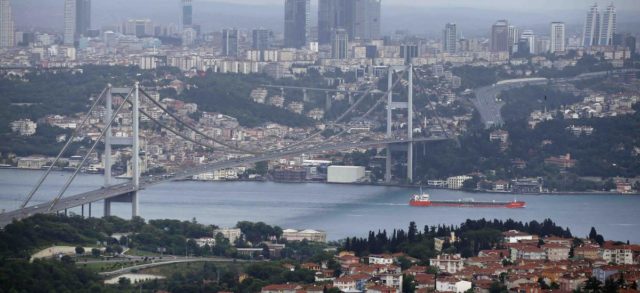Guardian of the Straits: Turkey’s Plans for a Bypass Canal and the Future of Montreux

Join The Jamestown Foundation at 1 PM April 14th for the webinar, Guardians of the Straits: Turkey’s Plans for a Bypass Canal and the Future of Montreux.
On April 7, Turkish President Recep Tayyip Erdogan announced that work on Kanal Istanbul would begin this summer. The $9.2 billion project, which will create a canal that will run parallel to the Bosporus Strait, has been marred in controversy, with critics alleging that it could threaten the Montreux Convention that has governed passage through the Straits since its signing in 1936. More than 100 former high-ranking Turkish naval personnel signed a statement criticizing the project to that effect. To date, Turkish officials have said that Kanal Istanbul would not affect the rules of the Convention, which limit the size and number of warships that can traverse the Straits. However, the new man-made waterway could allow the transportation of LNG shipments, potentially opening the Black Sea region to gas imports from the Middle East and North America.
To discuss the new canal and its potential geopolitical effects, The Jamestown Foundation has gathered Carlotta Gall, The New York Times bureau chief in Istanbul, Mitat Çelikpala, a professor of international relations and dean at Kadir Has University, and Matthew Bryza, the former U.S. deputy assistant secretary of state for Europe and Eurasia and Jamestown board member.
Click Here to Register
Featuring
Carlotta Gall
Istanbul Bureau Chief, The New York Times
Mitat Celikpala
Vice Rector, Kadir Has University
Matthew Bryza
Fmr. U.S. Deputy Assistant Secretary of State for Europe and Eurasia
Board Member, The Jamestown Foundation
Moderator
Glen Howard
President, The Jamestown Foundation
Click Here to Register
Participant Biographies
Matthew Bryza served for 23 years as a U.S. diplomat, over half of which was spent at the center of policy-making and international negotiations on major energy infrastructure projects and regional conflicts in Eurasia. His most recent assignment was as U.S. Ambassador to Azerbaijan from February 2011 to January 2012. Between 2005 and 2009, Bryza served as Deputy Assistant Secretary of State for Europe and Eurasia, with responsibility for Eurasian Energy, the South Caucasus, Turkey, Greece and Cyprus. Bryza simultaneously served as the U.S. Co-Chair of the OSCE’s Minsk Group mediating the Karabakh conflict, and as U.S. mediator of the Cyprus, South Ossetia and Abkhazia conflicts. From 2001 to 2005, Bryza served in the White House as Director for European and Eurasian Affairs on the National Security Council Staff. His responsibilities included Eurasian energy, the South Caucasus, Central Asia and political Islam in Eurasia. Previous assignments include Deputy to the Special Advisor to the President and Secretary of State on Caspian Energy, Advisor on Economic Reform in the South Caucasus and Central Asia, and Russia Desk Officer at the State Department, as well as Political Officer at the U.S. Missions to Russia (1995-97) and Poland (1989-91). Currently Ambassador Bryza resides in Istanbul, Turkey, where he also works as a consultant on business and democratic development and is a board member of several private companies.
Dr. Mitat Çelikpala is currently serving as a Vice Rector at Kadir Has University, Istanbul. Born in 1969 in Ankara, Turkey, Çelikpala studied the fields of political science and international relations. He obtained his MA degree in 1996 from Hacettepe University, Ankara and PhD from the Department of International Relations, Bilkent University, Ankara in 2002. He teaches graduate and undergraduate courses on Eurasian security, energy and critical infrastructure security/protection, Turkish foreign and domestic policy and the Caucasus. His areas of expertise are the Caucasus, North Caucasian diaspora groups, people and security in the Caucasus and Black Sea regions, Turkish-Russian relations, energy security, and critical infrastructure protection. He has published multiple academic articles and analyses on the above-mentioned areas, and he regularly appears in the media to discuss these topics.
Prof. Çelikpala is a board member of the International Relations Council of Turkey since 2004 and the Managing Editor of the Journal of International Relations: Academic Journal. He previously served as an academic advisor to NATO’s Center of Excellence for Defense Against Terrorism, in Ankara (2009–2012), particularly on regional security and critical infrastructure protection. Moreover, he was a board member at the Strategic Research and Study Center (SAREM), Turkish General Staff (2005–2011), as well as an Academic Advisor to the Center for Strategic Research (SAM), at the Turkish Ministry of Foreign Affairs (2002–2010) and to the Caspian Strategy Institute, Istanbul, Turkey (2012–2013). He was a Senior Associate Member at St. Antony’s College, Oxford University, UK (2005–2006).
Carlotta Gall is Istanbul Bureau Chief for the New York Times. She has worked for nearly 20 years for the Times as a foreign correspondent, covering many wars, and issues from terrorism, jihad and Islamist extremism, societies in transition from the countries of the former Soviet Union, and former Yugoslavia, to Afghanistan and Pakistan and those touched by the Arab Spring.
Her recent assignments have been in Tunisia and North Africa, and Afghanistan and Pakistan where she spent the best part of 12 years.
A British citizen, Gall began her newspaper career at The Moscow Times in 1994, reporting on the war in Chechnya and countries of the former Soviet Union, going on to work with the Economist and the Financial Times.
She was one of a team that received a Pulitzer prize for coverage of Afghanistan and Pakistan in 2009 and was awarded a Nieman Foundation fellowship at Harvard in 2011.
She is author of “The Wrong Enemy: America in Afghanistan 2001-2014,” USA, 2014; and co-author with Thomas de Waal, of “Chechnya: A Small Victorious War,” UK, 1996.



